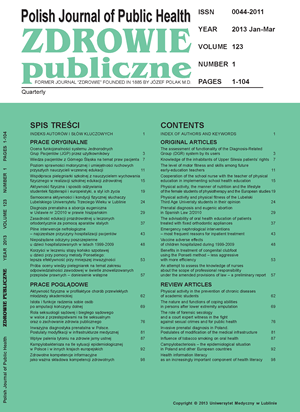Prenatal diagnosis and eugenic abortion in Spanish Law 2/2010
DOI:
https://doi.org/10.12923/j.0044-2011/123-1/a.07Keywords:
Spanish Law 2/2010, prenatal diagnosis, eugenic abortion, disabilityAbstract
Introduction. Since abortion was legalized in Spain in 1985, and official prenatal diagnosis programs implemented, eugenic abortion figures have raised yearly. The increase in use of prenatal diagnosis techniques has led, in turn, to the rise of a new form of discrimination, which is based on age and health conditions, against a vulnerable human group: disabled unborn.
Aim. To promote a new judicial framework for establishing a true regime for protecting human life right from the outset.
Material and methods. To achieve these goals a thorough review of the literature with regard to eugenic abortion and the Spanish Law has been undertaken.
Results. The Spanish Law 2/2010 allows one to abort
a fetus that’s physical or psychic differences were compatible with life and did not pose any danger to the mother, which would result in a clear case of legal discrimination, based on incapacity or a form of functional diversity or difference. The fetuses with disabilities (up to 22-week of pregnancy), in Law 2/2010, are not equal to others, since the disabled “nasciturus” receives less protection than the rest.
Discussion. A deep ethical debate regarding prenatal diagnosis is necessary. Nonetheless, the current socio-political framework in Spain makes the therapeutic use of prenatal diagnosis inseparable from its eugenic use, which, in turn, determines the bio sanitary framework when promoting abortion of disabled human beings and after a positive prenatal diagnosis.
Conclusions. The Spanish Law 2/2010 presumes the right to abortion until the 14th week of pregnancy because the “nasciturus” depends exclusively on the mother’s will as if it were part of her. The legalization of eugenic abortion represents an open violation of the constitutional principle of non-discrimination and of equal access to health care independent of disability.
References
1. Spanish Official Gazette. BOE on 12 July 1985;166:22041.
2. FIGO Committee for the Study of Ethical Aspects of Human Reproduction and Women’s Health. Aspectos éticos concernientes a la terminación del embarazo posterior al diagnóstico prenatal. Ethical Iss Obstet Gynaecol. 2009;4:328-32.
3. Cabero Roura JL. Declaración de la Comisión de Bioética de la SEGO sobre la Interrupción Voluntaria del Embarazo. Progresos de Obstetricia y Ginecología: Revista Oficial de la Sociedad española de Ginecología y Obstetricia. 2009;52(1):67-8. Review match
4. Wertz DC. Fletcher JC. Berg K. Report of consultants to WHO. World Health Organization. Review of Ethical Issues in Medical Genetics 2003, WHO/HGN/ETH700.4: 78.
5. AEBI. Conclusiones del VII Congreso Nacional de Bioética. Bioética y conciencia. Cuadernos de Bioética. 2009;70:503-6.
6. Spanish Medical College Organization. Deontological Code. Medical Ethics Guide; 2011.
7. Spanish Official Gazette. BOE, on 4 March 2010;55:21001-14.
8. Spanish Official Gazette. BOE, on 18 May 1985;119:18.
9. Spanish Official Gazette, BOE, on 18 May 1985;119:19.
10. Germán Zurriaráin R. La progresiva desprotección jurídica de la vida humana embrionaria en España: de la Ley 35/1988 a las Leyes 14/2006 y 14/2007. Cuadernos de Bioética. 2009;69:155-81.
11. Calvo Meijide A. El nasciturus como sujeto de derecho. Concepto constitucional de persona frente al concepto pandectista-civilista. Cuadernos de Bioética. 2004;54:294.
12. Higuera Guimerá JF. Las propuestas de introducción de “la solución del plazo” con indicaciones en el delito de aborto: sus problemas constitucionales. Revista General de Derecho Penal. 2009;11:1-52.
13. Spanish Official Gazette. BOE, on 18 May 1985;119:20.
14. Consejo de Estado. España Dictamen del Consejo de Estado ante la ley de salud sexual reproductiva y de IVE. 2009. p.1384.
15. Spanish Official Gazette. BOE, on 18 May 1985;119:1-25.
16. Spanish Official Gazette. BOE, on 22 January 1997;19:32-6.
17. Spanish Official Gazette. BOE, on 8 July 1999;162:67-80.
18. The Convention on the Rights of Persons with Disabilities. Spanish Official Gazette. BOE, on 17 September 2011;224:98872-79.
19. The International Covenant on Civil and Political Rights, on 23 March 1976, article 26. Spanish Official Gazette. BOE, on 30 April 1977;103:9340.36 Zdr Publ 2013;123(1)
20. The International Covenant on Civil and Political Rights, on 23 March 1976, article 5.2. Spanish Official Gazette. BOE, on 30 April 1977;103:9338.
21. Protocol No. 12 to the Convention for the Protection of Human Rights and Fundamental Freedoms (ETS No. 177 of the Council of Europe). Rome, on 4 November 2000.
22. Spanish Commitee of Representatives of Persons with Disabilities (CERMI), on 18 February 2009.
23. Spanish Commitee of Representatives of Persons with Disabilities (CERMI). Derechos humanos y discapacidad. Informe España 2008. Cinca, Madrid. 2009. p. 20.
24. Peláez A. Maternidad y discapacidad. Pérez Bueno LC. (dir.) Igualdad y Diversidad. Cinca, Madrid. 2009. p. 92-3.
25. Spanish Commitee of Representatives of Persons with Disabilities (CERMI). Derechos humanos y discapacidad. Informe España 2010. Cinca, Madrid. 2011. p. 88.
26. European Disability Forum (EDF). Annual General Assembly. Resolution. On pre-natal diagnosis and the right to be different. Athens, on 24 May 2003.
27. Disabled Peoples’ International (DPI) Europe. The Right to Live and be Different, on 13 February 2000.
28. González-Melado FJ. Di Pietro ML. Noninvasive prenatal genetic diagnosis: a bioethical reflection on the use of noninvasive prenatal diagnosis from the analysis of nucleic acids present in maternal peri-pheral blood. Cuadernos de Bioética. 2011;74:50.


